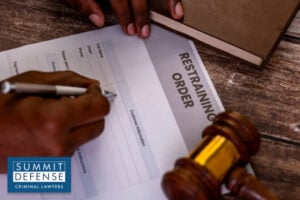
A domestic violence arrest can turn your life upside down in a matter of minutes. These cases often move fast and come with serious consequences that may affect your freedom, family, job, and future. Even if you feel the accusations are not true, the legal system will take them seriously. You may feel scared or unsure about what to do next, especially if you are facing domestic violence charges for the first time.
Summit Defense Criminal Lawyers helps people accused of domestic violence in California. Our team knows how the system works and what it takes to protect your rights. If you are asking yourself, “Are there defenses against domestic violence allegations?” the answer is yes.
With the right legal help, you may be able to fight the charges, clear your name, and avoid the harsh penalties that can come with a domestic violence conviction.
Understanding Domestic Violence Charges
Domestic violence charges usually involve harm or threats between people in close relationships. This includes spouses, former spouses, partners, people who live together, or family members. These cases can involve physical abuse, emotional abuse, or even financial abuse. California law allows police officers to arrest a person if they have probable cause to believe that some kind of domestic violence occurred, even without strong physical evidence or witness statements.
Some domestic violence cases are based on misunderstandings or false allegations. Sometimes, one party may use the legal system as a tool in divorce proceedings or child custody battles. Regardless of the situation, you have the right to a defense. Facing domestic violence charges does not mean you are guilty. You still have rights under the law.
Common Legal Defenses Against Domestic Violence Allegations
 There are several ways to defend yourself in domestic violence cases. A good defense depends on the facts, the evidence presented, and the credibility of the alleged victim’s story.
There are several ways to defend yourself in domestic violence cases. A good defense depends on the facts, the evidence presented, and the credibility of the alleged victim’s story.
Here are some of the most common defenses that may apply:
False Accusations
In some cases, the alleged victim may lie or exaggerate what happened. False allegations may come from anger, jealousy, or a desire to get the upper hand in a family dispute. Your defense attorney can look into past conflicts, gather evidence, and challenge the accuser’s story to show that no crime took place.
Lack of Evidence
To convict you, the prosecution must prove guilt beyond a reasonable doubt. If there is no physical evidence, no injury occurred, or the witness testimony is weak, your lawyer may argue that there is insufficient evidence. Domestic violence charges should never lead to a conviction without solid proof.
Self-Defense
If you acted to protect yourself from harm, that may be a valid defense. A self-defense claim works best when there is proof of imminent danger or reasonable force. Your attorney can show that the defendant acted to prevent serious injury, which is allowed under California law.
Mutual Combat
Sometimes, both people involved in the alleged incident acted violently. If both parties were aggressive, and there is no clear primary aggressor, this can raise doubts. Your defense strategy may include showing that you did not start the fight and were only reacting to protect yourself.
Alibi or Mistaken Identity
If you were not at the scene or the accuser misidentified you, that can be a strong defense. Your lawyer can gather evidence like phone records, receipts, or witness testimony to show that someone else may have committed the alleged incident.
No Criminal Intent
In some domestic abuse cases, there may be a misunderstanding with no intent to cause harm. For example, if the alleged incident was an accident or roughhousing that got out of hand, your attorney may argue that there was no intent to commit a domestic violence offense.
How Protective Orders Complicate Your Defense
 Protective orders can make your domestic violence case more difficult to fight, even before you step into a courtroom. Once a judge issues a no-contact order or temporary restraining order, you may be legally forced to leave your home, avoid contact with the alleged victim, and stay away from certain places like your job or your child’s school. These orders are often issued right after an arrest, sometimes without hearing your side of the story first.
Protective orders can make your domestic violence case more difficult to fight, even before you step into a courtroom. Once a judge issues a no-contact order or temporary restraining order, you may be legally forced to leave your home, avoid contact with the alleged victim, and stay away from certain places like your job or your child’s school. These orders are often issued right after an arrest, sometimes without hearing your side of the story first.
If you try to explain yourself or respond to the accuser, you might accidentally violate the court’s orders, which can lead to more criminal charges and hurt your defense. Even if the alleged victim wants to drop the case, the court may still keep the order in place. This can create extra legal problems and limit your ability to collect important evidence, speak to witnesses, or fully tell your side of what happened.
A strong defense strategy must account for these restrictions and find ways to work around them without violating any laws.
What to Do If You Are Accused
If someone accuses you of domestic violence, what you do next can seriously affect your case. It is important to stay calm, follow the law, and avoid making mistakes that could hurt your defense. A few smart steps early on can protect your rights and help your criminal defense lawyer build a stronger case for you in court.
Do Not Contact the Accuser
Even if you feel the accusations are false or unfair, do not call, text, message, or try to speak to the accuser in any way. Reaching out can be seen as a violation of a court order, especially if a no-contact order is already in place, and it can lead to new charges or jail time. Let your attorney handle all communication from this point forward.
Avoid Discussing the Case with Anyone But Your Attorney
It may feel natural to talk to friends or family members when you are stressed, but saying the wrong thing to the wrong person could hurt your case. Even innocent comments can be misunderstood, twisted, or used against you later by prosecutors or the court. Only share case details with your criminal defense attorney, who is there to protect your rights and give you the best legal advice.
Follow Any Court Orders or Bail Conditions
If a judge has given you any rules after your arrest, like staying away from the alleged victim or checking in with the court, you must follow them exactly. Not following court orders or violating bail terms can make things worse and could even send you back to jail. These rules are serious and must be followed while your case is still open.
Preserve All Key Evidence
Keep any information or items that can help your defense. This can include:
- Text messages, emails, or voicemails: These might show what really happened or prove that you did not act violently.
- Photos or videos: Pictures that show your injuries or that nothing was damaged can support your story.
- Medical records: If you were hurt, medical records can help show your version of events.
- Witness names and contact info: People who saw or heard what happened might help your case by backing up your side.
Consult a Criminal Defense Attorney Immediately
Do not wait to talk to a lawyer. A criminal defense attorney can explain your rights, help you with all the legal process, help you avoid mistakes, present sufficient evidence for you, and begin building an effective defense strategy right away. The sooner you get legal help, the better your chances of getting the case dismissed or the charges reduced.
Summit Defense Criminal Lawyers has helped many people in your situation and can work to protect your future starting today.
Why You Need a Domestic Violence Defense Attorney

- They Understand the Law: A domestic violence defense attorney knows the legal system very well. They can explain what the charges mean and what steps to take next. They help you make the right choices so you don’t harm your case.
- They Build a Strong Defense Strategy: Your lawyer will look at the facts, find helpful evidence, and create a defense that fits your situation. This can include showing false accusations, lack of proof, or self-defense.
- They Speak for You in Court: A qualified defense attorney will talk to the judge and prosecutors for you. This helps you avoid saying the wrong thing and protects your rights every step of the way.
- They Can Work Toward a Better Outcome: An experienced attorney may be able to get the charges dropped, reduced, or dismissed. They can also help you avoid jail or a permanent criminal record when possible.
- They Protect Your Future: Domestic violence charges can affect your job, your family, and your future. A good attorney helps you protect your life, your reputation, and your future opportunities.


 If you are facing domestic violence charges, do not wait to get legal help. These cases can move fast, and the stakes are high. Even one wrong step can hurt your future.
If you are facing domestic violence charges, do not wait to get legal help. These cases can move fast, and the stakes are high. Even one wrong step can hurt your future. 








